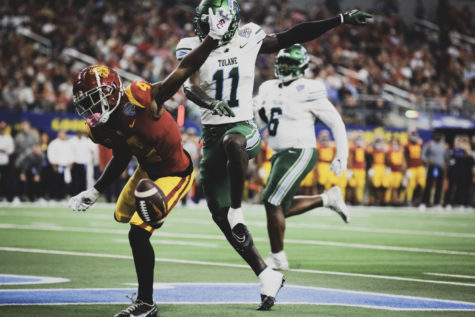OPINION | Tulane to Pac-12 is a terrible idea
May 5, 2023

Rumors that Tulane University would leave the American Athletic Conference and join the Pacific-12 Conference recently resurfaced. While those speculations are unlikely, there are several reasons why Tulane, a school on the Gulf Coast, should not join the Pac-12, a conference along the Pacific coast.
The primary incentive for a Tulane conference move is money. Currently, the AAC has a media rights deal with ESPN set to expire in 2032. The deal promises $1 billion dollars over 12 years, working out to $7 million dollars annually to each school. As for the Pac-12, its $3 billion deal, which pays schools $21 million annually, is set to expire next year.
Currently, the Pac-12 is struggling to renegotiate their media rights deal after the departure of two marquee programs to the Big Ten Conference: the University of Southern California and UCLA. That being said, its new deal will still likely be more lucrative than Tulane’s current situation.
The problems start with whether or not the Pac-12 will survive as we know it. Currently, the Big-12 is eyeing adding Pac-12 members University of Colorado-Boulder, University of Utah, University of Arizona and Arizona State University. If these dominoes fall, the University of Oregon and the University of Washington could jump to the Big Ten. Stanford University and the University of California, Berkeley are two other schools that could also move to the Big Ten.
The situation mirrors the early 2010s when the Big East Conference— in an act of pure desperation — added Tulane. In that case, the departure of the University of West Virginia, University of Louisville, Rutgers University, Syracuse University and the University of Pittsburgh hastened the collapse of that conference. In the end, the Big East split in two. Seven basketball-playing Catholic schools split off and became the “new” Big East. Meanwhile, the remaining schools rebranded the old conference as the AAC.
Tulane was lucky that the AAC turned out to be a good, well-established conference. If the Pac-12 collapses after Tulane joins, Green Wave athletics could be left in a much worse spot.
Even in a perfect world where the Pac-12 figures out its media rights deal, retains all its current schools and expands to include Tulane, moving to the Pac-12 is still a terrible idea.
Consider the student-athletes, especially for sports not named football — they would have to travel across the country to play their games, which are potentially in the middle of the week. Further, they would likely be exhausted from jetting around the country across two time zones, making the classes they do attend more challenging than they need to be.
This raises the important ethical question: what role does college athletics play for both the student and school? What is the proper balance between training athletes to an elite level and setting them up for academic success? High-level Division I athletics is a net-benefit for the institution. And, student-athletes will always make sacrifices in one area of their life to succeed in another. However, joining a conference that is primarily based across the country might be too much of a sacrifice for these student-athletes. Considering that less than 2% of student-athletes in most sports go on to play professionally, the school should not further impair students going for their degree.
A move is a poor idea from an athletic standpoint, since Pac-12 teams are so far away. A 2021 study mentioned that jet lag and travel fatigue create negative impacts on performance as well as increase athletes’ risk for injury and illness. These effects are evident in Tulane’s record in games played on the West Coast. Between baseball, men’s tennis, beach volleyball and volleyball, the Green Wave put up a combined record of 8-12.
With this choice, Tulane would not fulfill any of their obligations to their student-athletes either in the classroom or on the field.
Even for fans, this move is a bad idea. It is important to remember that the largest plurality of Tulane students are from the East Coast. Within the class of 2026, 46% percent of students hail from either the Northeast or South Atlantic regions. Compare that to 18% of students from the West Coast or Mountain West.
The Pac-12 often has their kickoff time for football games at 7 p.m. local time. For eastern Tulane students and alumni, games would start with a 10 p.m. kickoff. While the most devoted Tulane fans will always stay up until 1 a.m. to watch their beloved Green Wave, this will alienate more casual fans as well as students who do not want to stay up that late.
Luckily, Tulane athletic director Troy Dannen realizes all of this. In an exclusive interview with The Hullabaloo in January, Dannen said this: “I think the USC, UCLA move into the Big Ten begs the question of: what are we doing? … You know, I can’t imagine having our students fly across the country to compete athletically on a regular basis for a number of years.”
It would logically follow that Dannen is against Tulane moving to the Pac-12 for the same reason.
Dannen continues: “For a lot of folks, it’s an ego move. ‘Oh, I’m in the same league as blank and blank.’ … There’s a whole lot more that goes behind it than just the ego of who you’re associating with. There are a lot of folks on this campus that would probably prefer we were in the Ivy League, because those are the schools that they prefer we associate with.”
I am not against the principle idea of moving conferences and a hypothetical move to the Big-12, Southeastern Conference or the Atlantic Coast Conference could be a good idea for Tulane to keep in mind. However, Tulane to the Pac-12 just does not make sense.






















Leave a Comment